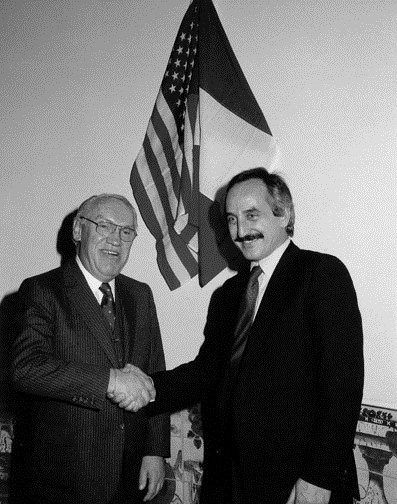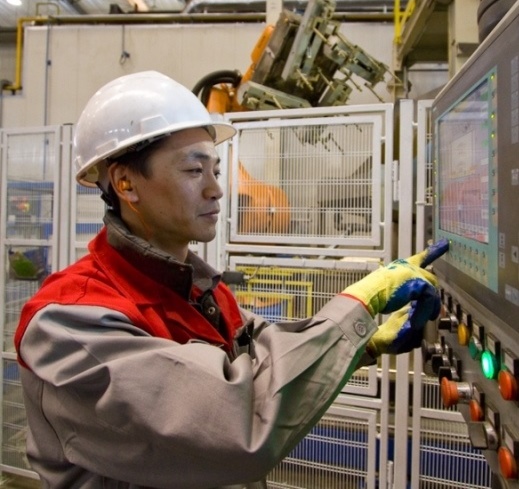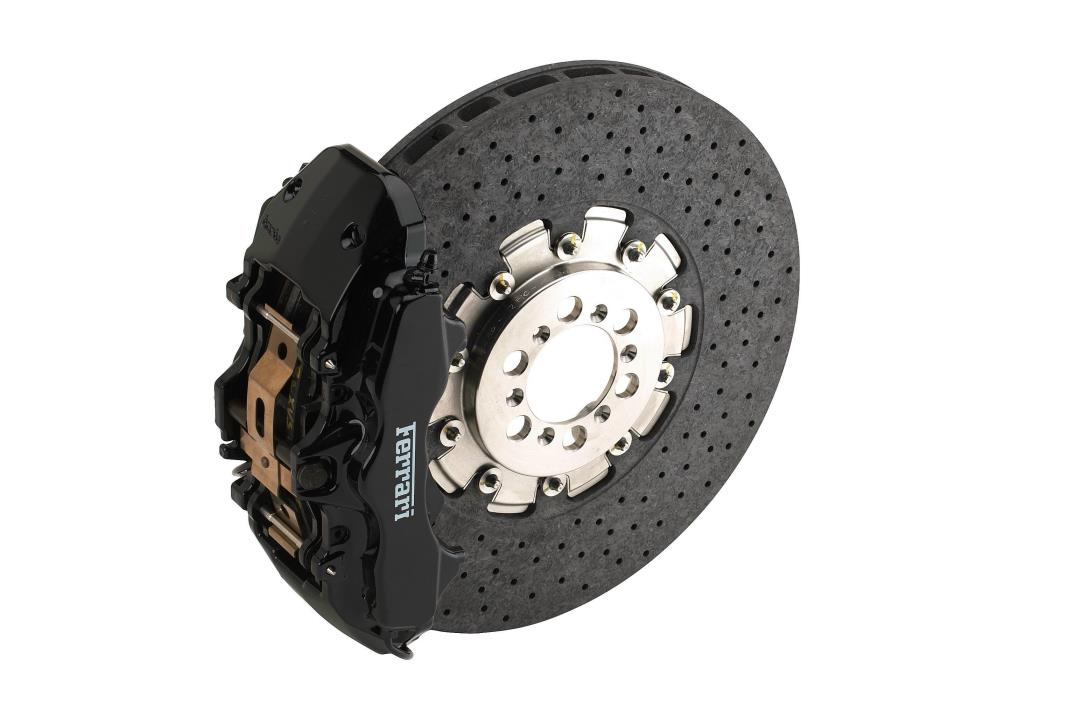The 1960s.
THE ORIGINS OF A LEADER
Brembo was founded in 1961 just a few kilometers outside Bergamo by Emilio, Sergio and Alberto Bombassei and Italo Breda.
While it began as a small mechanical workshop, the experience of its founder in the mechanical sector and metallurgy was soon put to good use for prestigious clients such as Alfa Romeo.
1964 was a historic year for Brembo, when the company started production of the first Italian brake discs for the spare parts market. Soon afterwards, production activities were broadened to include other braking system components, and the competence and specialisation of the company and the quality of its products and services earned international recognition.
This paved the way for Brembo to become the leader in the European spare part brake disc market.
The 1970s.
TRIUMPHS ON EVERY CIRCUIT
When it began supplying Moto Guzzi in 1972, the Brembo brand became associated with Europe's best motorcycles. Soon after, Brembo had secured the leadership in the motorcycle braking systems segment. But the greatest testament to the quality and technology of Brembo products came in 1975, when Enzo Ferrari asked the Bergamo based company to equip the most prestigious racing cars in Formula 1. It was not long before Brembo was the leading name in the motorsports braking systems segment.
Since then, countless teams using Brembo brakes have won hundreds of world championships in every possible automobile and motorcycle racing category.
The 1980s.
INNOVATION AND GROWTH
From the beginning of the 1980s, Brembo focused on developing innovative products and processes, with a clearly defined strategy of expansion in specialised areas of the market from passenger cars to motorsports and motorcycles. In 1980, the product range was joined by an aluminium brake caliper for automobiles which was revolutionary in both design and the materials used.
This new caliper was gradually adopted by high performance car manufacturers such as Porsche, Mercedes, Lancia, BMW, Nissan and Chrysler.
From the mid 1980s, Brembo decided to extend its operations into the industrial vehicle disc brake segment, becoming a strategic supplier for Iveco, Renault Industrial Vehicles and Mercedes.
In 1983, to give itself a more international scope, Brembo agreed to the acquisition of a share in the company by Kelsey-Hayes, a US based multinational braking systems manufacturer.
The resulting collaboration allowed the Italian management to grow and consolidate itself in preparation for the challenges of the future.

The 1990s.
AN ALL-ITALIAN COMPANY ONCE AGAIN
In March 1993, as a consequence of a new strategic orientation, Kelsey-Hayes withdrew as a shareholder in the company. Brembo decided to focus its energies on the future of the company and, indirectly, on the competitiveness of the Italian manufacturing industry, drawing strength from the expertise of its managerial personnel and its technological superiority.
When the company bought back the shareholding from Kelsey-Hayes, the goal set by Brembo's management was achieved in full. The company continued to grow throughout the subsequent years, and was listed on the Milan Stock Exchange in 1995: a success earned through intense teamwork, as is always the case at Brembo.
The 2000s.
EXPANDING THE BRAND GLOBALLY
Brembo inaugurated the new millennium with a strategy of market expansion, acquiring the Brazilian company Alfa Real Minas for the machining of automobile brake discs and the assembly of engine flywheels. Brembo also acquired the British company AP Racing Limited, which is specialised in the production of brake and clutch systems for race cars and motorcycles and for high performance sports cars. To strengthen its presence in the motorcycle segment, Brembo acquired 70% of Marchesini, a company specialised in the production of magnesium wheels for race motorcycles.

2000 also marked a decisive step forward in Brembo's incursion into the strategically vital Chinese market, with the creation of a joint venture with Yuejin Motor Group and the constitution of the company Nanjing Yuejin Automotive Brake System for the production of braking systems for automobiles and commercial vehicles.
Since 2008, Brembo has had a 70% shareholding in the joint venture NYABS. In January 2010, Brembo Nanjing Foundry Co. Ltd purchased a cast iron foundry from Donghua Automotive Industrial Co. Ltd, a member of the Saic group, China's leading manufacturer of automobiles and commercial vehicles.
This operation consolidated the Brembo Group's foothold in China by contributing to the creation of an integrated production centre in Nanjing, complete with foundry and machining plant for brake calipers and discs for automobiles and commercial vehicles.
The facility is now capable of offering braking systems to the Chinese market that meet Brembo's standards for performance, style and comfort.
Over the past decade, Brembo has also been looking with great interest to the Indian market. 2005 saw the creation of the Pune based KBX Motorbike Products Private Ltd., a joint venture between Brembo and Bosch's Indian subsidiary, Kalyani Brakes Ltd., for the production and commercialisation of motorcycle braking systems.
2009 was another landmark year, when Brembo inaugurated its new plant in India for the production of braking systems for motorcycles and scooters, and launched the new brand Bybre (an abbreviation of “By Brembo”) dedicated to braking systems for scooters and small-mid engine size motorcycles (up to 250 cc) for the BRIC markets (Brazil, Russia, India and China) and other countries in South East Asia (ASEAN).
In Europe, Brembo invests in Poland, where in 2006 the group's third foundry was opened in Dabrowa Gornicza to optimise the production cycle of the disc manufacturing plant.
In 2010 construction got under way for the expansion of this industrial centre, inaugurated in October 2011, for the automobile and commercial vehicle markets, with a goal of doubling output of brake discs.

2007 was a particularly important year for Brembo: the new Research and Development centre was inaugurated in the Kilometro Rosso Technology and Science Park, which employs over 500 engineers, designers and technicians working on research and development.
In the meantime, the company continues its strategy of international growth, acquiring the Brakes division of Hayes Lemmerz International in the USA: a division consisting of two plants (one near Detroit, Michigan and another in Mexico) that produce brake discs and drums for automobiles and commercial vehicles for the North American market.
Brembo's activities in Eastern Europe were further consolidated in 2010 with an investment of over 35 million Euros in the Czech Republic for a new automobile braking system plant.
This move brought the company for the first time into the mid premium segment, working with clients such as Land Rover, BMW, GM and Audi.
The acquisition of new brands and products
From 2010 the Brembo range is complete for the parts market as well: their vast experience gained in braking systems and co-operation with the major automotive manufacturers has allowed Brembo to offer a complete package of components for braking systems at maximum levels of performance, reliability and safety.
A complete range of pads, shoes, drum brake kits and hydraulic components for brakes and clutches is added to the traditional offer of discs and drums intended for professionals in the parts market.
That same year, Brembo launched the new Bybre brand in India: the brand dedicated to braking systems for scooters and small to mid engine sized motorcycles (up to 600 cc). The new Bybre range is produced in the Pune plant, which was inaugurated in 2009.
Carbon ceramic technology
Brembo has always been a pioneer in using innovative materials to continuously improve the performance and durability of its products. Carbon/carbon has been used since the 1970s in braking systems for aerospace applications and since the 1980s in motorsports. Since 2000, carbon ceramic (CCM) has also been used in the production of braking systems for sports cars, as it offers substantial benefits in terms of performance in both wet and dry conditions, weight, comfort, corrosion resistance, durability and high-tech appeal.
To develop the best possible applications for this innovative material, the company Brembo Ceramic Brake Systems SpA was founded in 2003 at the new “Kilometro Rosso” Science and Technology Park in Stezzano. This was a joint venture between Brembo and Daimler Chrysler AG for the development and production of carbon ceramic brake discs.
Daimler subsequently withdrew from the venture while Brembo continued in this direction with SGL Group, with which it constituted an equal joint venture in May 2009 dedicated to carbon ceramic brake discs - Brembo SGL Carbon Ceramic Brakes. The mission of the company is to develop braking systems in carbon ceramic and to manufacturer and commercialise carbon ceramic brake discs exclusively for the automobile and commercial vehicle OEM markets.
The medium term objective of the company, which is actively engaged in the research and development of innovative materials, is to develop a new generation of CCM brake discs for larger scale applications.
Brembo SGL Carbon Ceramic Brakes employs in its two facilities at Stezzano, in the Kilometro Rosso Science and Technology Park, and at Meitingen in Germany. Its client portfolio includes prestigious automotive marques such as: Aston Martin, Audi, Bentley, Bugatti, Daimler, Ferrari, General Motors, Lamborghini and Porsche.

Brembo grows in North America
In 2014, North America was confirmed as a target market in the process of internationalisation being undertaken by the Brembo Group: the company inaugurated its plant in Michigan to produce brake systems for its main automotive customers in the North American market.
Immediately afterwards, Brembo announced the start of construction on a cast iron foundry in Michigan, in an area adjacent to the new plant in Homer, commencing the process in the United States of vertical integration of production capacity. The foundry, together with the technical departments and the warehouse, will cover an area of 30,000 square metres and in all will provide 250 new jobs at the offices in Homer and Plymouth.
Finally, work was begun in 2015 on the construction of a foundry and a new plant for the production of aluminium calipers in Escobedo, Nuevo Leon, near Monterrey in Mexico. The plant will begin production in 2016 and will be fully operational by the end of 2018. Production at the new site will be dedicated to the main European, Asian and American original equipment manufacturers (OEM) already present in or about to establish manufacturing facilities in Mexico, as well as to those buyers of Brembo products in the United States.
Consolidation in Asia and a new path to become solution providers
In 2016, Brembo finalized the agreement for the acquisition of ASIMCO Meilian Braking Systems, a Beijing company manufacturing braking systems, and simultaneously announced an investment for the expansion of its plant in Poland, as well as the construction of a new plant for the manufacture of aluminum calipers in Nanjing, China, inaugurated just three years later.
In 2018, Brembo celebrated the laying of the first stone of the new plant for the manufacture of special carbon materials in Curno, Italy, and now, in 2021, the company has completed the acquisition of SBS Friction, a Danish company that develops and produces motorcycle brake pads in sintered and organic materials, which are particularly innovative and eco-friendly.
At the same time, Brembo begins a new journey to become an authoritative Solution Provider, by integrating increasingly digital and sustainable products and services.
This mission is based upon Brembo’s strategic vision, “Turning Energy into Inspiration”, which relies on the experience the company gained in 60 years of managing kinetic energy regenerative braking systems, with the goal of inspiring new generations towards a better future for mobility and guaranteeing the Group a long-term competitive edge in a sector in constant evolution.
Brembo’s new Mission aims to anticipate the impact of mega trends such as electrification, digitalization, autonomous driving and sustainability, which are molding the automotive industry, with the ultimate objective of contributing, together with its clients, to providing the best driving experience.
